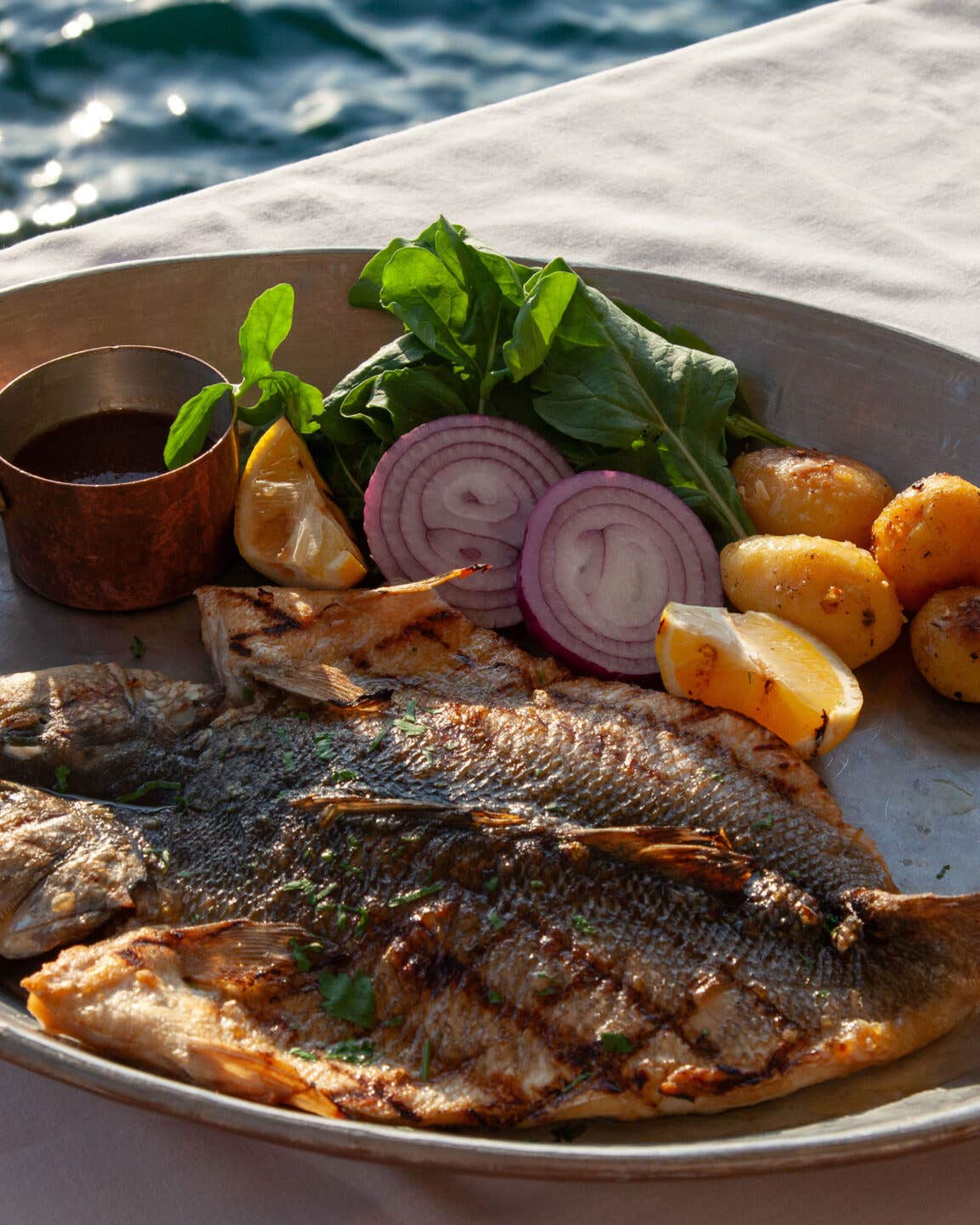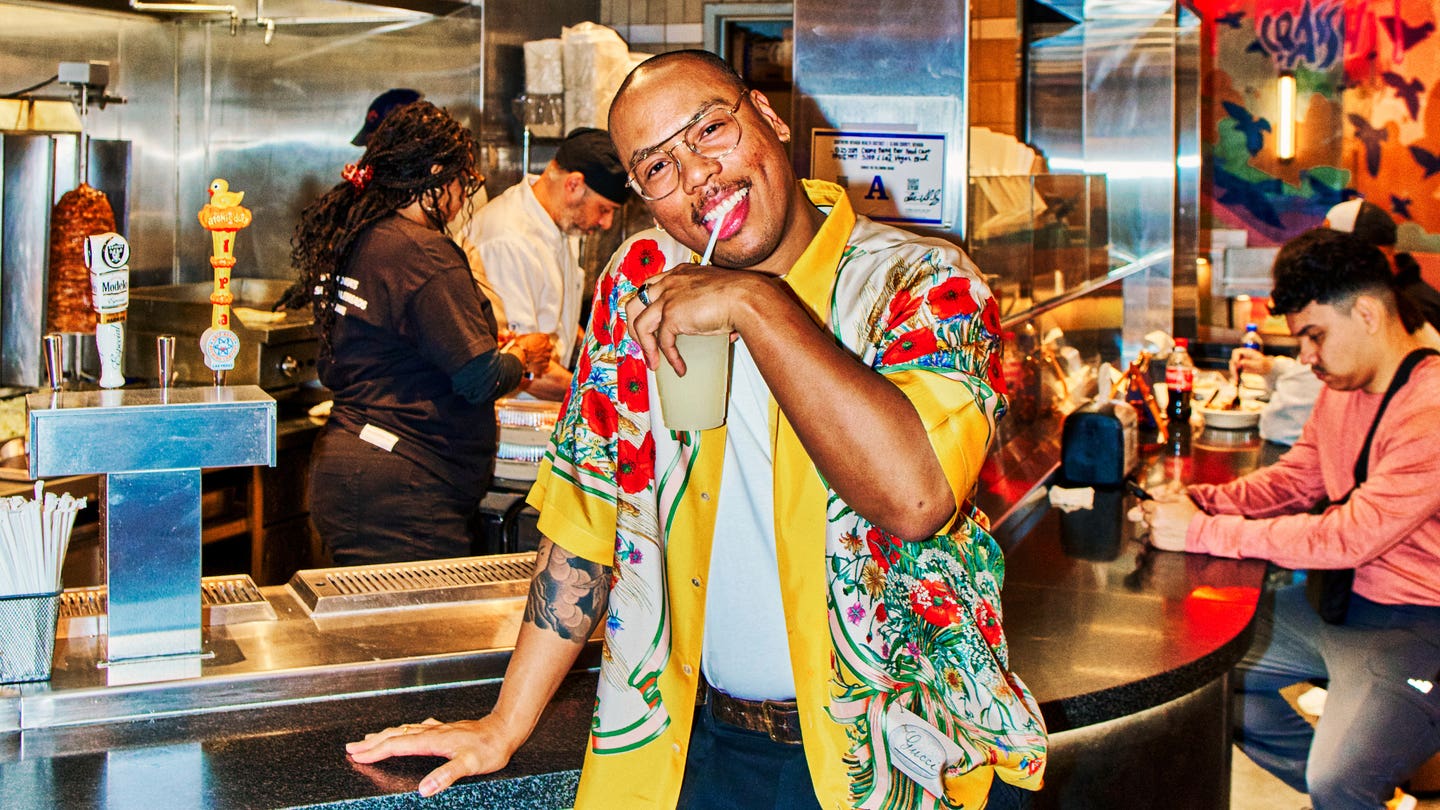
Everlasting Feast: Food in the Republic of Georgia
In the Republic of Georgia, bold, unique flavors, ancient methods of winemaking, and epic meals are at the center of a way of life
I've thought about this meal so many times now that the memory of it feels like a dream: I'm seated at a table whose surface I can no longer see—it has disappeared entirely underneath dozens of overlapping plates. There are only six of us, but the food laid out could easily feed 30. There are loaves of bread; plates of white, salty sulguni cheese; platters of peppery raw radishes, pickled tomatoes, and palate-freshening parsley, tarragon, and green onions; earthenware dishes called ketsi filled with grilled mushrooms and fried potatoes; jars of fresh yogurt and little bowls of rose petal jam and honey to add to it; bottles of tarragon soda; and pitchers of wine, some purple-black saperavi and others amber, apricot-scented rkatsiteli.
It's early autumn, and I'm in a town called Bodbiskhevi in Kakheti, the easternmost region of the Republic of Georgia. We're an hour into a dinner in the backyard of Gela Patalashvili, a winemaker here. His vineyards stretch for miles in every direction. If I squint, the tawny, arid landscape, thickly planted with grapevines and dotted with pomegranate and cypress trees, reminds me of Tuscany—that is, if Tuscany were bordered by the snowcapped Caucasus Mountains and home to a 7,000-year-old winemaking tradition. Gathered around the table are my husband, Chris, and a handful of Georgian and American expat friends. After a day of helping Gela pick plums from his orchards, we've been invited to join him for dinner, which, as dinners tend to do in Georgia, has turned into a several-hour feast called a supra (meaning "tablecloth" for the way the food covers the table), a celebratory meal involving structured toasts, wine, song, and lots and lots of food.

Credit: Landon Nordeman
Gela's wine propels the feast forward. As our host, he takes on the role of tamada, or toastmaster, walking us though a series of rousing salutations on which we're invited to riff, or if we prefer, simply raise our glasses and affirm, "Gaumarjos! Victory!" He reminds us that no sipping of wine is permitted between toasts—just when the toast is made. We nevertheless empty quite a few glasses before the night is through. The wine and the toasting suffuse the meal with a sense of purpose, with an ongoing poetic conversation, and an intensifying sense of communion.
Just when I am certain that there is no more room on the table, Ekaterina, Gela's wife, brings in mtsvadi, skewers of sizzling pork that have been grilled over a fire of last year's dried grapevines. As Ekaterina approaches the table, Ketevan Mindorashvili, a folk musician and the wife of our friend John Wurdeman, bursts into song, and others join in, singing a dissonant three-part harmony that gives me goose bumps:
Mtsvadsa mas mshveniersa da dadgromilsa momtansa amisasa ats vadidebdet.
Let us now praise this beautiful and roasted meat, as well as the one who brought it to us.
Someone hands me a skewer, and I pull off the piping-hot meat with my fingers, dunk it into a sour plum sauce, tkemali, and devour it. It's perfect: juicy, smoky, with a salt and pepper crust, the fat buttery and full of flavor. Between the meat, the wine, the song, and the feeling of deepening friendship, I want to freeze this moment in time forever.
I first visited the Republic of Georgia in 2002, when I was 21 years old. I was traveling with my mom, an ethnomusicologist who'd been coming to the country for years to study the local music. We landed in Tbilisi at a dimly lit airport, a faded modernist building constructed in the waning years of the Soviet Union. From the capital, we took a taxi two hours into the countryside to the town of Sighnaghi, where Mom had purchased a dilapidated dacha to use as a retreat for her choral group. We entered, expecting it to be empty, and found the house lit up, full of the good smells of cooking: Her musician friends had already let themselves in, taken over the kitchen, and laid out a feast in the backyard—my first supra, though I didn't know the word for it then.
On that weeklong visit I fell in love with Georgia. I swooned over its dramatic landscape. Though just the size of West Virginia, as it stretches from the Black Sea in the west almost to the Caspian Sea in the east, it traverses everything from Alpine mountains to deserts to subtropical citrus groves. I was intrigued by the ancient language, which, with its loop-de-loop script and mellifluous tones, bears no relation to any other. And while its food was clearly influenced by its neighbors—Persian ways of using fruit to enrich meat stews; a penchant for mayonnaise-y salads that were a remnant of Soviet rule—Georgian cooking was still utterly its own: bold, with an emphasis on fresh ingredients and pure flavors. Instead of fat and flour, walnuts, which grow here in abundance, were used to thicken sauces, and it seemed that fenugreek, coriander, and tarragon were in nearly everything. But I was moved most of all by the generosity of the people, strangers who would insist I stay for a meal if I so much as asked for a drink of water. It got under my skin, and I wanted to get to know this place.

Credit: Landon Nordeman
I returned to Georgia a few times over the next several years, eventually spending ten months there in 2006 when Chris, a poet, became as obsessed with Georgia's verse as my mother was with its music, and received a grant to translate Georgian poetry. The two of us lived in an apartment in Tbilisi. While Chris crunched through translations, I wrote a food column for a local English-language paper that paid $12.50 a story—not quite enough to live on but more than enough to cover the cost of dinner. It was a year of extraordinary eating: We lived on beans stewed with walnuts; platters of khinkali, dumplings stuffed with everything from pork to farmers' cheese and mint; flatbread filled with molten cheese and topped with an egg; and pkhali, cooked vegetables seasoned with a heady blend of ground walnuts, spices, and herbs. I loved every bite.
Easy as it was to eat our way through Georgia, it was hard to feel at home there. I spoke Georgian at the level of a two-year-old and was frustrated with my inability to communicate.
I was clueless about how to accomplish everyday tasks; because I couldn't figure out how to pay the phone bill, the wire connecting our apartment to the grid was repossessed. And we were lonely. When we tired of feeling like strangers, we went back to Sighnaghi, where my mother's friends—now our friends, too—would welcome us with wine, food, and a place to relax. These visits had a way of restoring us. However alienated I sometimes felt, I always had a seat at their tables.
After the grant was up, we moved to New York, imagining we might return in a year or two. Instead, I ended up taking a full-time job. I gave birth to our daughter. I grew up a bit. As the years passed and our lives changed, the months we had spent in Georgia felt more distant. But as time went on, its grip on my imagination grew stronger. I was worried that it might have all changed, that if I went back, I would no longer recognize it. I was hungry to return and renew old friendships. I wanted to reassure myself that it was real—that it was still there.
Six years later, I finally make it back to Georgia. Gela, whose supra years ago had come to symbolize what I love about this place, has partnered with our friend John Wurdeman to found Pheasant's Tears, a boutique winery and wine bar in Sighnaghi, and they've invited me to visit. From the moment the plane lands, I can see change. Georgia has been looking for ways to align itself culturally, politically, and economically with the West, and it shows. In Tbilisi there's a shiny new airport, and modern hotels dot the skyline. In more remote areas, change is happening, too, though it's not as obvious. On the drive over to Sighnaghi, factories and massive fields give way to vineyards, farm plots, and orchards, and tin-roofed two-story brick houses with figs, pomegranates, and grapes—always grapes—growing in the yard. The car rounds a bend, and the town comes into view, the familiar silhouette of its 18th-century steeples and red-tiled roofs on a hillside jutting out over a vast valley. As we drive through the town, I notice the main road's been repaved, and that the historic buildings all look freshly painted.

Credit: Landon Nordeman
We pull up in front of a doorway marked Khokhbis Tsremlebi—"Pheasant's Tears"—and I exit the cab and walk through the doorway, which leads to a cobblestone courtyard. I first see a baker making bread in a tone, a tall tandoori-like oven that has existed in this part of the world since time immemorial. Coals smolder at the very bottom, and the clay walls radiate heat. The baker slaps dough against its inner walls. After a few minutes, she hands me a loaf. It's damn good—fragrant and crisp on the outside, white and fluffy within.
I walk past her to the wine bar's tiny kitchen, which issues forth the most amazing smells. I find Gia Rokashvili, who owned a convenience store when I was last here. "Gamarjoba! Hello!" Gia exclaims. As we catch up, he explains that Sighnaghi was the recipient of a grant for historical restoration and tourism development—which accounts for the smooth road and fresh paint. New shops have opened up, and his store has gone out of business. Hence, he says, his job as a cook.
Gia sings "Let It Be" under his breath as he prepares khashlama, a regional meat stew he's making with veal and sour plums. He cuts veal shoulder into chunks and places them in a pot with water, not quite enough to cover them. Then he chops a heap of green onions, tarragon, cilantro, and mint, along with a few salt-fermented plums—an intensely sour and biting ingredient that Georgians use to bring piquancy and depth to all kinds of slow-cooked dishes. I want to eat standing in the kitchen, but Gia shoos me out. Instead, John joins me at a table in the barroom for a few glasses of wine and some of Gia's food.
It's this moment that really drives home how far things have come in the six years I've been gone. Gia sends out dishes, and each is recognizably Georgian but with a twist. For one, the food is plated tapas style. Fresh yogurt is drizzled with smoked sunflower oil; a vegetable salad, made not from blanched vegetables as is common but from smoky eggplant and red peppers that have been grilled over the tone. And the khashlama, usually a hearty, stick-to-your ribs dish, here is delicate and fall-apart tender.
I'm skeptical for about half a second, until I start eating. It's all delicious. And the veal, infused with tarragon and accompanied by the salty-sour plums, is as astonishing as ever, with those big contrasting flavors that are the hallmarks of Georgian cooking. The setting and presentation may be different, but the soul of the food is the same: forceful, honest, awesome.
The next day I visit John's home where his mother-in-law, Leah Beroshvili, is making lunch. Having eaten Leah's wonderful cooking on every visit to Georgia, I am looking forward to this meal. Leah, 73, her dark brown hair pulled back into a bun, wears an ankle-length black skirt, sturdy black shoes, and an apron with a chile pepper print. She smiles and waves me to a seat next to John and Ketevan. Today she is making katmis satsivi, chicken in walnut sauce. "Es chemi saquareli sachmelia," Leah says. "It's my favorite dish," one that's been in the family for generations. Her mother-in-law made it especially well and with a sense of joy that inspires Leah's cooking to this day. "You always felt warm when you ate her food," she says. It's exactly how I feel about Leah's cooking.
Leah throws several handfuls of walnuts into the bowl of a food processor, followed by spoonfuls of blue fenugreek, a subtle Caucasian variety, and coriander seeds, cloves, cinnamon, plus an orange-gold spice that I can't immediately identify. Leah gestures to the ceiling strung with garlands of drying marigolds. "Es zaprana aris," she says. "Marigold flour." I taste a pinch; it reminds me of thyme.
Then she breaks down a boiled chicken, cracking the breastbone and peeling the meat from the rib cage. In a skillet, she heats sunflower oil and adds the meat, turning it with her knife until it's browned all over. While the chicken cooks, she pulses the spices and walnuts until they're velvety and fine, then spoons in chicken fat from the frying pan and a few ladles of broth that she's reserved. She warms the sauce until it's thick enough to coat the tip of her finger. While the satsivi finishes, Leah sautes some eggplant until it's blistered, slathers it with a sauce she's made from walnuts, fresh herbs, and spices, then scatters red onion on top—she would have preferred pomegranate seeds, she tells me, but couldn't find any at the market this morning.
Acharuli Khachapuri (Cheese and Egg Bread)
Filled with melted cheese and topped with a runny egg, this flatbread is best eaten hot—tear off the crust and dunk it in the well of cheese and egg.
Credit: Landon Nordeman
Finally, Leah makes khachapuri, a cheese-filled flatbread that's griddled until crispy on the outside and gooey within. When it's ready to serve, Leah slides it from the pan and quarters it. The crust is browned in spots, and as the knife cuts through, cheese oozes out. She shuttles it to the table and we eat it hot, balancing the scalding buttery wedges on our fingertips and trying to catch every melting drip. Ketevan brings out a carafe of chacha, a grappa-like spirit that she infused with violets picked from nearby meadows. It's crystal clear, with a sweet fragrance: spring in a bottle. "For the grace of the morning," John says. We clink glasses.
We sit and eat, murmuring over the creamy walnut sauce of the katmis satstivi, helping ourselves to the silken slices of eggplant, nibbling grapes from the front yard and local pears that taste of honey.
"May bitterness be away from us and sweetness be in our lives," John says, raising his glass. We drink.
I look around the table, savoring the food, the company, the feeling of being here. I know that the moment can't be trapped in amber, but I no longer want it to be. I know that whatever changes come for Georgia, for my friends, and in my own life, these simple but important things—the pleasure that comes from cooking and eating with people whom I cherish so much; the sincerity and spontaneity of the supra—will endure.
John offers one more toast for the road: "To what you do with love." I raise my glass and say wholeheartedly, "Gaumarjos!"
Keep Reading
Continue to Next Story











